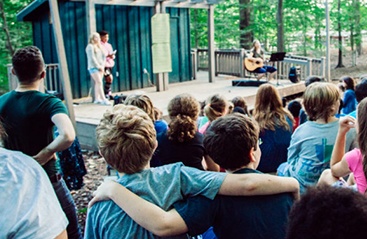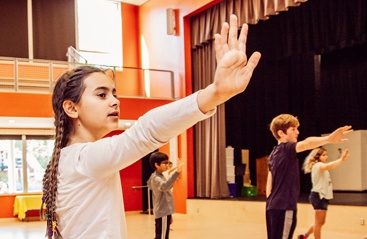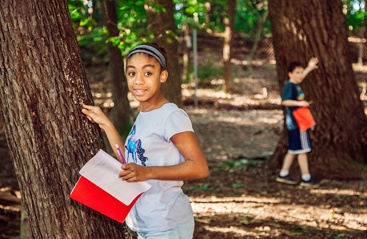Addressing Your Child’s Anxiety
It’s the start of another school year, and in my tours through classrooms and about campus I like what I am seeing and hearing. Students and teachers are well engaged in establishing community, routines, and mutual expectations, students are focused and enjoying learning (and the campus), and we’re welcoming our new community members. I have appreciated receiving many upbeat reports from students, parents, and teachers!
Even amidst such a strong and happy start, however, there are bound to be some bumps and challenges. It’s natural with any transition. And it’s as true for adults as it is for children. Accordingly, though many of the first day jitters are long past, it’s expected that we’ll see children who experience some worry during the first part of the year.
Some anxiety is academic. Am I up to speed and ready for x grade? The move up or down the hill? Without intending to, parents, including this one, can contribute to this academic anxiety. That anxiety, spoken or not, may involve comparisons (sometimes unconscious) to Burgundy classmates or siblings, and even friends and acquaintances attending other schools. Or just expressions of worry. We’ve got to get those math facts down pat! I’m not saying there’s no place for that worry, but we should take care. It’s hard to put away our adult expectations and take a more developmental and friendly approach to monitoring our students’ progress. But, indeed, it is helpful. Knowing when to push and when to lay off is hard. Here is an easy-read parenting article that offers some insight.
Other anxiety is more social: Do I have any best or ‘old’ friends in this class? Will I make friends? Does anyone like me? So-and-so said they have 15 friends, and I am not sure I have any!
Even the most popular child can be anxious or insecure at times. It’s perfectly normal! And as children are developing on various axes in different ways and at differing paces and developing their own and new interests, it is also natural that a reliable friend or playmate from one year may not easily carry over, or be forever that special friend.
Anxiety may manifest on car rides home or in comments or questions shared at bedtime or in the morning. At our house, an array of feelings and sometimes surprising personal narratives seem to surface at bedtime, just at the time we as parents are thinking our parenting has concluded for the day! But I’ve found it helpful to listen carefully and then try to reassure, if I can. That reassurance includes telling a child when something uncomfortable may be more universal than they know, and there are ways to cope. Also, looking on the bright side at what we may have to be grateful for, even if there are some challenges, too. (This is a regular wellness practice for me personally!)
Our kids may share a story of something someone said or did that made them feel vulnerable or excluded. We as adults can relate! Yes, some children (people) will say unkind things to their classmates (office mates or colleagues). Sometimes more forcefully, sometimes subtly. Perhaps they’re trying to order things and make ‘space’ for themselves. But all of these things can hurt. So-and-so does not want to be your friend or I’m saving this seat for so-and-so…. (You know, Tony was really upset about what you said at the meeting)…
Combined with normal adjustments to new teachers and classrooms, any and all sorts of social-friendship concerns easily can spill over into academic issues.
Teachers work carefully to be supportive of their classes developing friendly social norms. Not everything surfaces to the teachers, however. Sometimes they need a student or parent to share information. More often children may be able to work it out themselves, given the tools. As parents, we might keep in mind a few things: 1. Our kids can learn to cope with some of the ambivalent or unkind treatment that will be experienced even in a smaller, gentle community; 2. Our children often take their cues from us adults about how to handle things; 3. Escalating parent anxiety rarely helps reduce a child’s anxiety over a situation; and 4. No matter how much we love them, we can not live their lives for them.
While we don’t want to be dismissive of our children’s adjustment worries we also don’t want to feed them. Acknowledging the feelings as real (and human and even familiar) is important. But so is offering context. Parents can be really good at that!
Reassure your child that all children feel similar emotions at the start of a new school year. Different children express their worries differently. Some can be shy and withdrawn, hoping to be included. Others will be more domineering and controlling. Neither is wrong or right, they just are. We can advise our kids to try to be more or less one way or the other and not to become too fixated on any one relationship. But in the end, they have to work through their own situations for the most part, and we should take care not to get too deep into the minutiae of our children’s social relationships. Experts or clinicians will advise that if we live our children’s lives too much for or with them, we are hindering their healthy development. Children so often take their cues from us. While we don’t want to miss something major, our keeping an even keel can help them do the same. When in doubt, consider speaking with teachers, Pat Harden, our school counselor, Barb Turner or Chiquita McCoy, our Learning and Differentiation Specialists for the lower and middle schools, Elizabeth or Jared, me, or an outside professional.
Admittedly, maintaining a healthy detachment can be easier said than done, especially if we’re fearful that our child is suffering or being ignored or otherwise ill-treated, or that they are behind in some intractable way. Here are some general tried-and-true, probably familiar, suggestions of what can help your child navigate the start of the year.
-Maintain an optimistic parental outlook
-Reinforce routines (in ways that support wellness and child and family)
-Cultivate positions of gratitude (remember all we have that’s positive!)
-Don’t let homework be a family issue (it’s primarily between students and teachers)
-Don’t over-focus on ‘results’ (like grades)
-Resist over-scheduling; instead leave space for kids to be kids/recharge with unstructured time
-Use travel and meal times to connect in positive ways (tech free)
-Resist focusing on the negative/don’t ‘interview for pain’
-Teach coping strategies for when other children are unkind, not inclusive, etc.
-Speak with peer parents to help you find your best tone and parenting postures!
Inquire Now
Burgundy is a one-of-a-kind independent school for Junior Kindergarten through 8th Grade. We believe children learn best in an inclusive, creative, and nurturing environment that engages the whole child.
3700 Burgundy Road
Alexandria, VA 22303
703.960.3431
Accredited by:
Affiliated with:
Partners with:
©2025 Burgundy Farm Country Day School
Designed and developed by The Design Channel![]()







